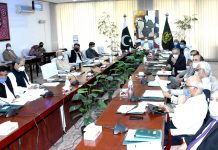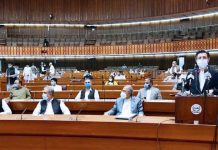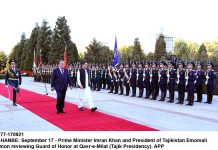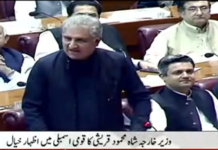KARACHI: The World Wide Fund for Nature-Pakistan (WWF-Pakistan) and the Planning and Developm
ent Department, government of Balochistan, have entered into a memorandum of understanding (MoU) to explore future avenues of a long-term partnership in environmental conservation and sustainable development of the province.
In order to address environmental and development challenges in Balochistan; especially the adverse impacts of climate change, natural
resource degradation, and future planning for sustainable development, an MoU was signed between both organizations on Friday. WWF-Pakistan will support and act as an implementing partner of the Planning and Developm
ent Departme
nt and other line departments including the Fo
rest and Wildlife, Energy, Agriculture, Fisheries, Tourism and Culture, and Environment departments in environme
nt and development related initiatives.
In various advisory capacities, both organizations will support each other in implementing projects, technical reviews of larger projects and activities (e.g. EIA, SEA), surveys and assessments, feasibility studies by the Government of Balochistan in natural
resource management (NRM), environmental education programmes and awareness campaigns, capacity building and training needs assessment (TNA) initiatives, implementation of bilateral agreements, Geographical Information System (GIS) mapping and monitoring and geo-fencing of natural
resources with line departments. WWF-Pakistan will also provide technical assistance in the alignment of interventions with national development frameworks such as Vision 2025 as well as provincial development frameworks. Furthermore, it will improve technical knowledge and skills through a comprehensive education and awareness campaign for academia, me
dia, judiciary, CSOs and other partners.
The Planning and Developm
ent Department will provide overall strategic direction and vision while ensuring the alignment of interventions with national development frameworks such as Vision 2025 as well as provincial development frameworks.
Speaking on the occasion, Hammad Naqi Khan, Director General WWF-Pakistan shared that Balochistan’s developme
nt and economic indicators are not at par with other provinces. He believed water scarcity is one of the key constraints to economic development. Apart from natural gas reserves, Balochistan has significant potential for alternative energy
resources; particularly wind and solar energy. ‘WWF-Pakistan is striving to strengthen planning and economic management of the province and will also enhance institutional capacity for proper execution of development schemes’, he added.
Meanwhile, Mohammad Ali Kakar Secretary Implementation, Planning and Developm
ent Department, Government of Balochistan said that the department is utilizing all its
resources to improve socio-economic conditions and creating alternative income generation opportunities for people. ‘The Department, in collaboration with WWF-Pakistan, is exploring other funding opportunities for the uplift of people and strives to promote climate resilience and sustainable development in the province,’ he added.













